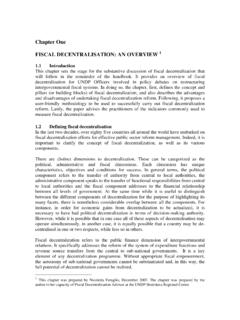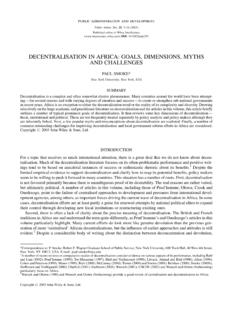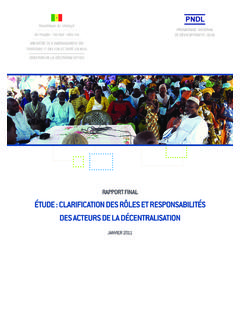Transcription of Regional Councils and Decentralisation
1 NAMIBIA. Regional Councils and Decentralisation : EDITION 2 2005. At the Crossroads Graham Hopwood June 2005. Executive Summary 1. Introduction 2. Historical context 3. The implementation phase Progress since 2000. Impediments in the way 4. Political considerations Funded by: 5. Conclusions Published by: EXECUTIVE SUMMARY. Regional Councils have been in existence for 12 years, yet their activities and plans have received little attention outside the confines of government. Constrained by limited powers, a lack of funds, and a longstanding view among some leading politicians that they are political experiments' which may one day be abolished, Regional Councils have been waiting for the policy of Decentralisation to give them a more meaningful raison d'etre. Yet the Decentralisation project has moved slowly, held back by non-cooperative ministries, a lack of staff and resources across the board, and the complex details of the policy itself. Five years after the Decentralisation Enabling Act (Act 33 of 2000).
2 Decentralisation , at least in terms of the Regional Councils , has yet to be enabled'. However, much groundwork has been completed in anticipation of the delegation and later devolution of central government functions and it is possible that, with the necessary political backing, the process could speed up considerably. Decentralisation is a means of creating participatory democracy in which the grassroots can have a direct say in the decisions that affect their lives. Regional Councillors, as the only elected politicians in Namibia who have clear links with constituents, can play a huge role in this process. The Decentralisation of powers to the Regional Councils is now at a crossroads. The government of President Hifikepunye Pohamba (2005-) could give new impetus to the process or it could be allowed to run out of steam. The onus is also on the Regional Councils to demonstrate they are both capable and accountable enough to accept delegated responsibilities. This will mean establishing exemplary records on financial accountability and ensuring that consultative committees are working effectively down to village and settlement level.
3 If Decentralisation plods along at a similar rate to the last nine years, then the system of Regional government will not achieve anywhere near its potential, and its usefulness in an era when wasteful spending is being targeted, is bound to be questioned. 02. 1. INTRODUCTION the policy, the law that will govern and administer the implementation of the Twelve years after Namibia's system policy in terms of legislative procedures of Regional government was put in was not in place. The legal framework place, the 13 Regional Councils have for Decentralisation has now been in very little meaningful power. The place for nearly five years, yet policy Regional Councils Act (Act 22 of 1992). implementation is still widely seen stated that Regional Councils are as proceeding at a slow pace. In an responsible for planning the develop- article published to mark Namibia's ment of regions, but otherwise gave 15th Independence anniversary, the them mainly advisory powers. At the MRLGH concluded that the lack of a end of 1996 the Cabinet adopted timeframe for Decentralisation seems to a Decentralisation policy and this lead to some relaxation and lack of was launched as a Decentralisation commitment to implement the policy as Programme for Namibia in March 1998.
4 A whole (MRLGH 2005b:68). Some seven The policy was given legal force through years after the launch of Namibia's a series of new laws introduced in 2000, Decentralisation Programme, the time most notably the Decentralisation would now seem opportune to begin Enabling Act (Act 33 of 2000). Nearly the process of analysing how the five years since this Act became law, Decentralisation debate fits into and despite much groundwork being Namibia's broader political context, undertaken, no function of central how far Decentralisation has progressed, government has been decentralised and what impediments may still be in the manner envisaged by the Act. blocking the way. In 2000 the then Deputy Minister of The paper begins with an overview Regional and Local Government and of the historical context of decentrali- Housing (MRLGH) 1, Professor Gerhard sation, since events prior to Namibia's T temeyer (2000-2004) (2000a:95) independence have shaped the wrote: Namibia's history of democratic Regional governance system in Namibia Decentralisation is still in its infancy.
5 And defined the parameters of public Any value judgement on its possible debate about it. The implementation success would be premature. Comments of Decentralisation since the inception can thus only be made on its contents, of Regional Councils in 1992 is then intentions, objectives and feasibility. considered, focussing on the progress In an interview with the Institute for made and the obstacles that remain. Public Policy Research in August 2001, The prospects for effective decentrali- then Minister of Regional and Local sation of powers to Regional Councils Government and Housing, Dr Nickey are then considered in terms of Namibia's Iyambo (1996-2002) (Keulder 2001:1) current political situation, particularly predicted that the introduction of Swapo's dominance and the recent legislation would speed up the commitment to clamping down on Decentralisation process. When asked wasteful gover nment spending. about the time lapse between the Finally, some conclusions are offered launch of the policy and its implement- concerning both the discourse about ation, he said: The reason for it taking so Decentralisation and the practical long was that at the time of formulating implementation of the policy.
6 1On March 21 2005 the name of the Ministry was changed to the Ministry of Regional and Local Government, Housing and Rural Development. In this paper, the Ministry is referred to by the abbreviation MRLGH in connection with its activities before March 21 2005. and by the new title in relation to its programmes and plans after this date. 03. 2. HISTORICAL CONTEXT by eleven ethnic administrations in 1980, known as second tier authorities. Any analysis of the development of The legislative assemblies of these Regional governance in Namibia cannot authorities were dominated by political be divorced from the country's painful parties such as the Democratic Turnhalle history of colonialism and apartheid. Alliance (DTA), which would become Imperial Germany occupied what was the official opposition in 1990. In then known as South West Africa in 1884, December 1988 South Africa agreed to as European powers scrambled to carve withdraw from Namibia and allow a up sub-Saharan Africa.
7 During 29 years United Nations peace plan to be of German rule, parts of the indigenous implemented. After a century of colonial population were forced out of their occupation and a 23-year liberation traditional areas (particularly in central war, Namibia held its first democratic and southern Namibia), most notoriously elections, under the auspices of the during the 1904-07 war against the United Nations, in November 1989. A. Herero and the Nama people. The Constituent Assembly (CA) consisting of German occupation ended with military 72 members was elected, with Swapo defeat in 1915, as South Africa, repre- gaining the majority of seats but not a senting the allied forces in World War I, two-thirds majority that would have took over the territory. South Africa enabled the party to write the continued the practice of seizing constitution on its own. In February 1990. farmland in central and southern the Constitution was unanimously Namibia, while restricting the indigenous adopted and Namibia became population to native reserves'.
8 In 1962, independent on March 21 1990. The Pretoria established the Odendaal system of Regional Councils , set out in Commission, which followed the the Constitution, was established through apartheid thinking of the time and the Regional Councils Act (Act 22 of recommended dividing Namibia along 1992) and the first Regional council racial and ethnic lines into ten elections were held from November 30. homelands'. The recommendations to December 3 1992. Swapo has were implemented from the late 1960s dominated every election at local, onwards, partly through the forced Regional and national levels since removal of communities. In 1966 the independence, and since 1994 the party South West Africa People's Organisation has held a two-thirds majority in the (Swapo), which had been formed six National Assembly (NA), giving it the years earlier, launched an armed power to change the Constitution. The struggle for the independence of second chamber of parliament, the Namibia (accepted by the United National council (NC), which reviews Nations as the name of the country in legislation after it has passed through 1968).
9 Swapo consistently campaigned the NA, is made up two Regional for Namibia to become an independent Councillors from each of the 13 regions. unitary state and opposed the policy of They are nominated to serve in the NC. setting up homelands (also known as by their fellow Regional Councillors. bantustans) through the popular slogan One Namibia, One Nation'. Many of Namibia is constituted as a sovereign, the homeland governments' were secular, democratic and unitary state . dominated by tribal chiefs or headmen. (Republic of Namibia 1997: 1). A unitary The homeland system was replaced state is run by a centralised, national 04. government and any Decentralisation Councils . Instead the debate was framed of powers, responsibilities and functions by two concerns. Firstly, whether Namibia to lower tiers of government can be should have a unicameral or bicameral revoked by the central government. system, and secondly, that the admin- A federation, in contrast, consists of istration of Namibia's future regions self-governing regions operating under should not resemble the much hated a central government.
10 The governing bantustan system of ethnic government powers of the regions are usually imposed before independence. In his constitutionally entrenched and seminal work, Namibia's Post-Apartheid cannot easily be overriden by central Regional Institutions: The Founding Year, government. The homeland policy Joshua Bernard Forrest (1998:4) notes of the South African apartheid govern- that: As a consequence of the history ment designated areas for black of apartheid in Namibia, the notion of a people, usually along ethnic lines. Regional division of power or Regional These bantustans, as they became political structures carries a negative, known, were reviled by the indigenous pro-apartheid connotation for most post- population and never recognised independence government officials and internationally even though some were for most Namibian citizens.. given an independent' status by Swapo went into the CA with Pretoria. In Namibia, South Africa's commitments to a unicameral system homeland policy transmuted into the and the holding of national elections creation of 11 ethnic administrations based on single member constituencies, in 1980.







